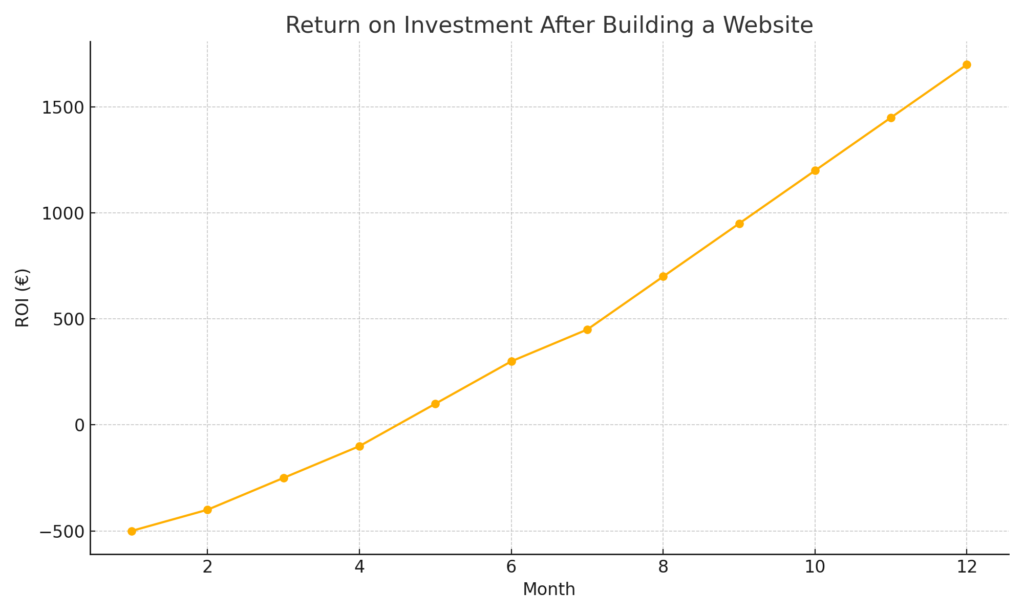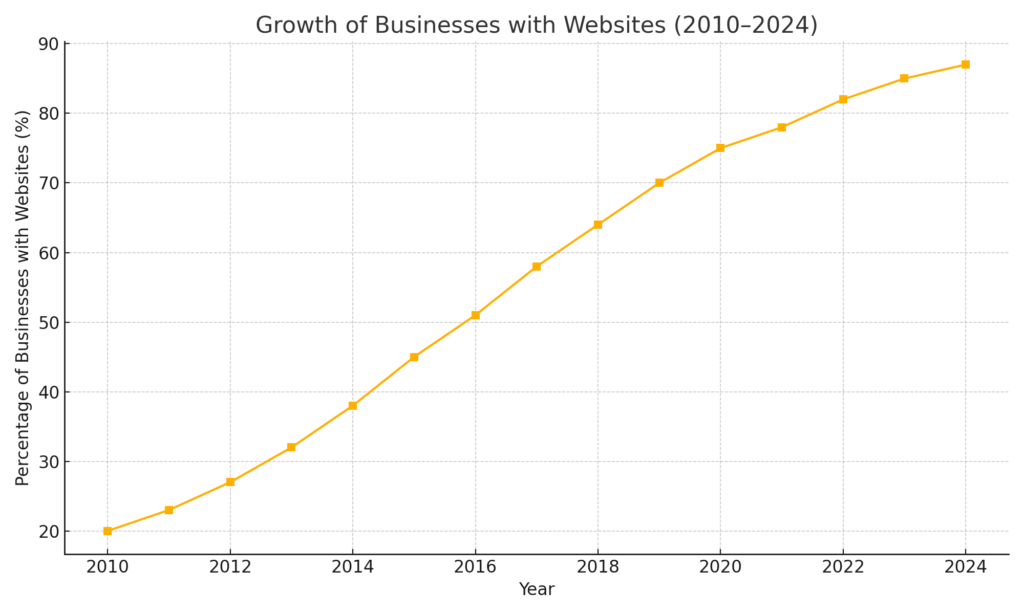
Creating a Website for Your Small Business
Published: June 1, 2025
As a small business owner, you might wonder whether you really need a website.
It’s often assumed that a strong online presence is only for big companies, but even the smallest business can benefit greatly from having a quality website.
A quality website can help your small business reach a wider audience and build trust with customers, helping you stand out from the competition.
It acts as a digital storefront for your business where you can showcase your products or services, provide important information (like hours and contact details), and tell the story of your company – all accessible to potential customers 24/7.
In this guide, we’ll explain why a website is important for small businesses and how to create a successful site that delivers results.
We’ll go through the key components every effective website should have (responsive design, SEO, speed, contact forms, etc.), discuss the advantages of hiring professional web designers versus using DIY tools, offer guidelines for choosing a web designer, and give an overview of website costs (starting at around €500).
Finally, we’ll share practical tips for small business owners to help you get the most out of your website.

Why a Website Is Important for Small Businesses
Most consumers today search online before deciding where to buy – roughly three-quarters of consumers check a business online before visiting in person.
If you don’t have a website, many of your potential clients wont know about you.
A website serves as a digital storefront and credibility card for your business, giving you the opportunity to present yourself in the best light and provide the key information that customers look for.
Beyond visibility, a professionally made site also helps build trust with customers.
People quickly judge a company’s professionalism by its online presence – about 75% of users base a business’s credibility on its website design.
That means if your site is outdated or unprofessional (or you don’t have one at all), you risk not being taken seriously by potential clients.
Conversely, a modern, up-to-date website lets a small business project professionalism and instill confidence, just like larger companies do.
Key Components of a Successful Website
What does it take for a small business website to be effective? Focus on these key components when building your site:
- Responsive design (mobile-friendly): A large portion of web traffic comes from mobile devices – more than 60% of visits are now on phones or tablets. It’s crucial that your site works well and looks good on all screen sizes. Responsive design ensures your website’s layout and content automatically adapt to the visitor’s device, providing a user-friendly experience whether they’re on a smartphone or a desktop computer.
- Fast load times and reliability: Visitors expect a website to load quickly – within a few seconds. If your site is slow or frequently crashes, people will leave in a hurry. In fact, 53% of mobile users will abandon a site if it takes longer than three seconds to load. Therefore, optimize your site’s speed by using a good hosting provider, compressing images and code, and minimizing unnecessary scripts or plugins. A fast, stable site not only improves user experience but also helps your search rankings, as search engines favor faster websites.
- SEO optimization (search engine visibility): Most online experiences begin with a search engine – around 68% of all internet activity starts with a search query. SEO (Search Engine Optimization) involves tuning your site so it ranks higher on Google and other search engines for keywords related to your business. For a small business, that means using relevant keywords in your content, having a technically sound site (proper meta tags, headings, sitemap, etc.), fast performance, a secure HTTPS connection (SSL certificate), and perhaps investing in local SEO if you target a specific area. Good SEO will significantly increase the chances that potential customers find your company online.
- Clear calls-to-action and contact info: Every business website should have a clear goal – for example, to encourage the visitor to contact you or request a quote. Highlight a prominent call-to-action (CTA) button like “Contact Us” or “Get a Quote” to guide visitors toward the next step. Also, make sure your contact information is easy to find (on a dedicated contact page and/or in the site footer). Provide a contact form, email address, phone number, and even a physical address if relevant. The easier you make it for interested visitors to reach out, the more likely they are to convert from casual browsers into actual customers.
Advantages of Hiring Professionals vs. DIY Tools
Now that you recognize the importance of a website, you might ask: should you build it yourself using DIY tools or hire a professional?
DIY website builders (like Wix or Squarespace) allow you to create a site yourself at low cost, but here are some benefits of hiring a professional web designer instead:
- Expertise and quality: An experienced web designer knows how to blend functionality and aesthetics effectively. They will create a unique design tailored to your brand (rather than a cookie-cutter template) and use best practices in development so your site is technically sound and secure. The end result is a more polished website that makes a stronger impression on visitors, helping your business appear more credible.
- Time savings: Building a website takes time – especially if you’re not familiar with web design. Instead of spending days or weeks learning tools and troubleshooting issues, hiring a professional lets you spend that time running your business. Time is money, and a pro will likely get your site up and running faster and more efficiently, with far less hassle.
- Optimized performance and SEO: Professional developers know how to optimize a site “under the hood.” They’ll produce clean code, ensure your site loads quickly, and structure it with SEO in mind from the start. DIY builders can make design easier, but they often add unnecessary code or have limitations that slow your site down or hinder optimization. A professional will make sure your site runs smoothly and can be easily found on search engines, leading to a better user experience and more traffic.

Guidelines for Choosing a Web Designer
If you’ve decided to hire a professional to build your site, here’s how to find the right web designer or agency:
- Do your homework & set expectations: Before contacting anyone, outline what kind of site you need and your budget. Research potential designers – look at their portfolio and client reviews to gauge their style and quality. Also clarify what their service includes (design, development, SEO, content, timeline, support after launch, etc.) so you know exactly what you’re paying for. Pick someone who inspires confidence and offers fair value for your budget.
- Communication is key: Pay attention to how the designer communicates from the start. A good designer will ask questions and listen to your needs to understand your business and goals, rather than offering a one-size-fits-all solution. Make sure you feel comfortable talking with them and that they explain things clearly – smooth communication will make the whole project go much easier.
How Much Does a Website Cost?
The cost of a small business website can vary widely based on your needs.
A basic small business website (a few pages of essential information) might cost around €500, while more advanced sites with additional features will cost more (possibly reaching a few thousand euros).
The price usually doesn’t include your domain name and hosting, but those are relatively small costs.
While spending a few hundred euros may seem significant for a tight budget, remember that a good website often pays for itself. A quality website is one of the most cost-effective marketing methods.
Once your site is up and running, every new visitor you attract through search or social media comes at virtually no extra cost, which greatly improves your marketing return on investment.
Tips for Small Business Owners
Finally, here are a few tips tailored to small business owners who want to make their website a success:
- Start simple: You don’t need a huge, perfect website from day one. Begin with the core pages and information your customers care about (who you are, what you offer, how to contact you). Better to have a clear, straightforward site than a complicated one. You can always add new sections or features later as your business grows.
- Treat your website as an investment: Set clear goals for what you want your website to achieve (e.g. more inquiry emails or higher sales), and consider promoting it (through SEO, social media, online ads) so your target audience can find you. Remember, a website is an investment – if it’s well built and used well, it will pay off by bringing in new customers.
- Keep it maintained and up to date: A website isn’t a “set it and forget it” asset. Check periodically that everything works correctly and update your content when you have news (e.g. new products, changes in hours, fresh photos or testimonials). Outdated information or broken parts of your site can leave a bad impression. If you don’t have the time or know-how to handle technical maintenance, consider hiring someone to do it.
With a well-designed website and these tips in practice, even a small business can shine online. If you want to take advantage of reaching borader market, learn more about service of creating a website.
New web is waiting for you
We turn your website visitors into euros. Contact us and increase your profits today!